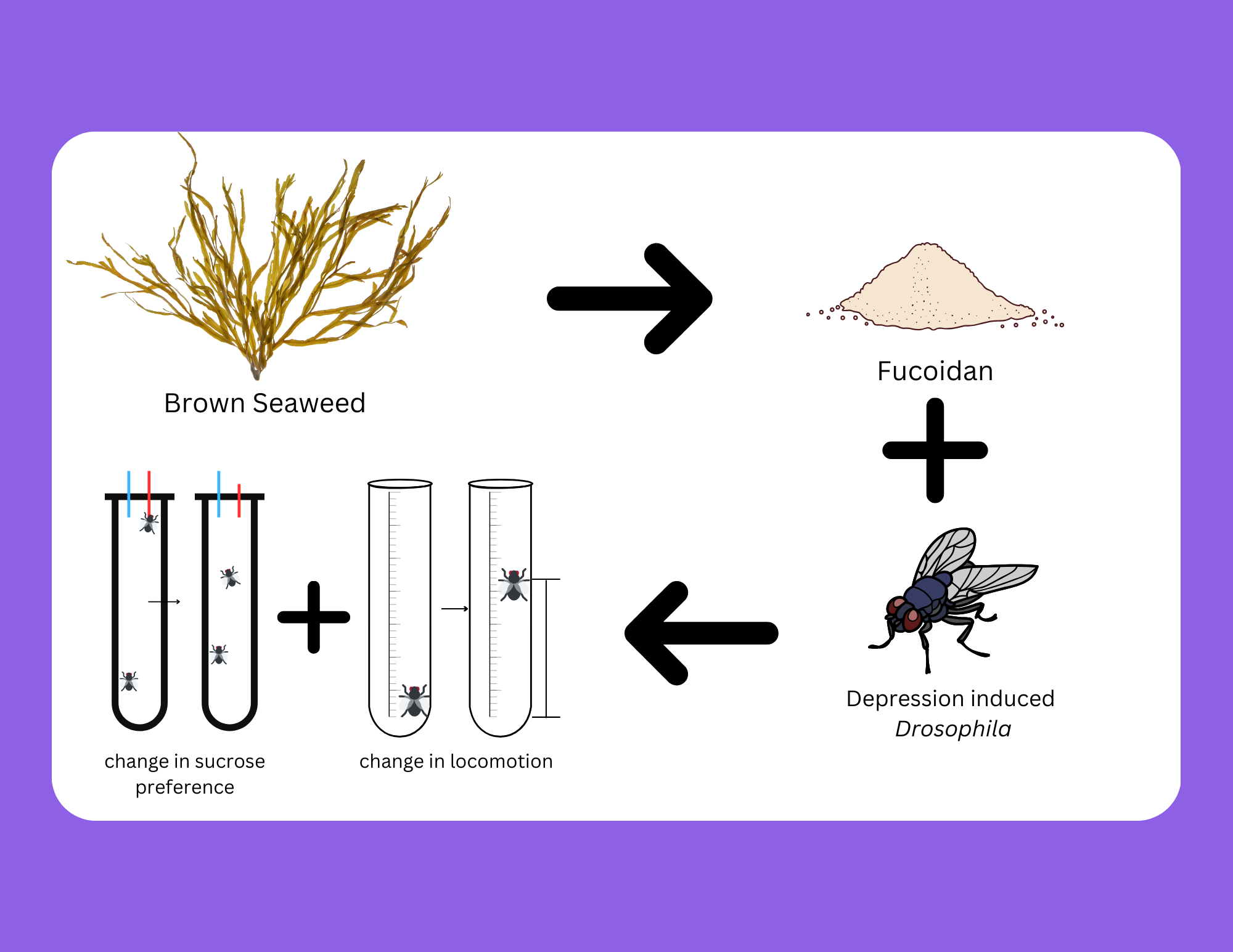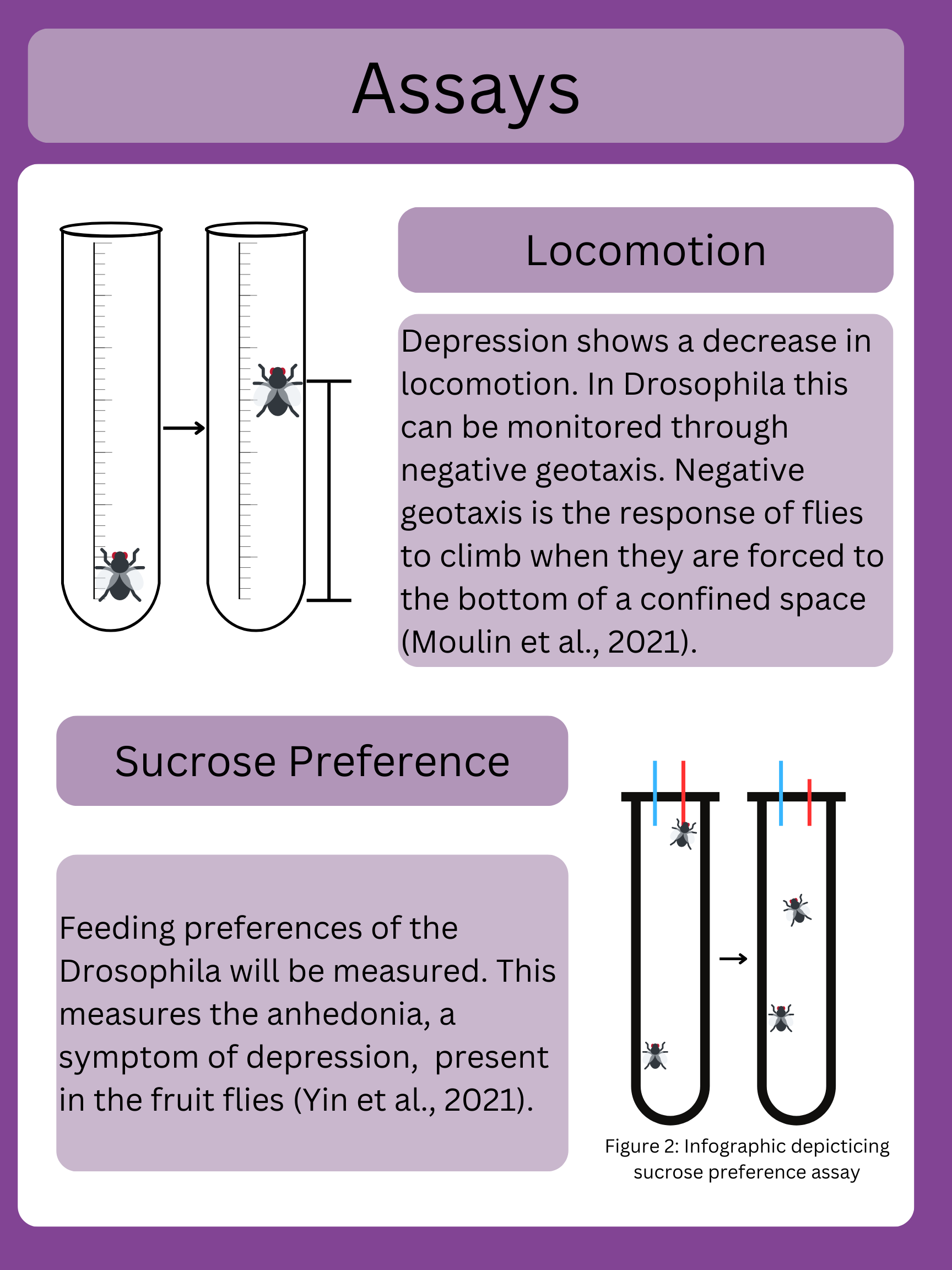STEMI
Class description
STEM with Scientific and Technical writing is taught by Dr. C. In STEM1 we work on a five month long research project of our choosing. Through this project we learn how to communicate scientific research through presentations, writing a grant proposal, writing a thesis, and more.
STEMI Project
The effects of fucoidan on depression using a Drosophila melengaster model
Project Overview
In this five month long research project, I tested for the effects that fucoidan, a component of seaweed has on depression. For this project I tested depression-induced Drosophila for behavioral symptoms linked to depression. The hypothesis that fucoidan would decrease the severity of depression was not proven true.
Abstract
Depression is a common mental illness that affects many people. Recently, studies have shown the gut:brain axis has a significant impact on mental illness. Brown seaweed has been believed to have many pharmaceutical benefits for centuries. One polysaccharide found in brown seaweed, fucoidan, has the potential to cause antidepressant effects when included in a patient's diet. To test the effects of fucoidan on depression, a Drosophila melanogaster model will be induced with depression using two different methods: administering L-Dopa through their diets and chronic unpredictable mild stressors to induce “learned helplessness”. Different fucoidan dosages were tested for their effects on locomotion and feeding preferences. This project evaluates the effects 0.1% and 1% fucoidan diets had on Drosophila induced with depression, specifically the effects on locomotion and sucrose preference.
Graphical Abstract

Project Proposal
Research Question
Can fucoidan decrease the amount of depression symptoms presented by a Drosophila melanogaster model?
Hypothesis
If depression induced Drosophila melanogaster are given fucoidan in their diets, then the symptoms of depression will decrease.
Background
Depression is a common mental disorder that is very prevalent in today's society. According to the American Psychiatric Association, an estimated one in six people will experience depression at one point in their life (Torres, 2020). The Gut to brain axis is shown to have a significant effect on mental illness. Prompting the question: is diet or are specific foods capable of being used to treat depression. There are current medications for antidepressants, but they have many issues that could cause inability or for a patient to take them (“Selective serotonin reuptake inhibitors(SSRIs)”, 2023). Research into foods that can treat depression is needed, and fucoidan may be one of them. Fucoidan is a sulfated polysaccharide. It is primarily found in brown seaweeds (Meinita et al., 2021). Previous studies have shown fucoidan and Hizikia fusiformis, a type of brown seaweed containing fucoidan, to have possible antidepressant effects (Jung et al., 2023; Li, et al., 2020). Fucoidan was tested for its antidepressant effects in the D. melanogaster model.
Process Infographic

Process
Drosophila melanogaster, more commonly known as the fruit fly, uses many of the same neurotransmitters as mammals, but they are easier to study. This makes them the preferred model for many neurological studies (Martin and Krantz, 2014).In this study, Drosophila melonogaster were induced with depression through the inclusion of levodopa (L-DOPA) into their diets and through chronic unpredictable mild stressors (CUMS). 0.1% and 1% fucoidan diets were tested for their effects on depressive symptoms. Negative Geotaxis (locomotion) and sucrose preference was tested for. Negative geotaxis is the response of flies to climb directly after they have fallen. This is tested through sharply tapping a gradulated cylander containing Drosophila on a table 3 times and tracking how far each fly climbs in 5 seconds. Sucrose preference is the amount of preference towards sugar water or water that Drosophila show. This is tested through monitering how much of each the flies consume in a 24 hour period. More about these Assays is displayed in the infographic on the left.
Important Info
The rest of this page is sample text as data and graphs have not been finalized yet, except references are the true references used.
Sample figure 1
Sample figure 2
Analysis
In the sucrose preference two sample t-tests was run to check the significance of the data. The box and whisker plot shows that this data had no outliers, therefore proving the assumption of normal distribution of data. There was no statistically significant data in the sucrose preference test; including, the comparison between the control L-dopa group and main and control group. Two sample t-tests were also used to analyze the locomotive data. Even though there was no normal distribution of data, there were over 30 data points from each group. In the data from the locomotive assay, there is statistically significant data proving a difference in the overall mean locomotion. The mean locomotion of the L-Dopa groups was less than that of the control.
Discussion/Conclusion
The data suggests that the hypothesis is incorrect. There was no statistically significant data in the sucrose preference test; including, the comparison between the control L-dopa group and main and control group. Due to no significance between the control group it can be hypothesized that the extent L-Dopa effets sucrose preference is not great enough to where sucrose preference can be used as a behavioral marker for depression of flies administered L-Dopa. In the data from the locomotive assay, there is statistically significant data proving a change in overall mean locomotion. The mean locomotion of the L-Dopa groups was less than that of the control, showing an increase in depression.
This differs from the previous study that showed a decrease in depressive symptoms (Li et al., 2020. This could be due to differences between studies of how depression was induced.
After analyzing the data, the new hypothesis is that by increasing the amount of fucoidan present in the diet of Drosophila melanogaster, the severity of depression will increase.
e
References
Feb Fair Poster

